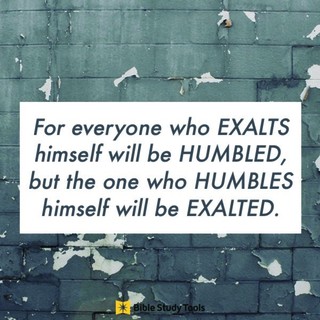- Recent Translations
- All Translations
Lukas 14
Share
Settings
Lukas 14 Commentary
Chapter 14
Christ heals a man on the sabbath. (1-6) He teaches humility. (7-14) Parable of the great supper. (15-24) The necessity of consideration and self-denial. (25-35)
Verses 1-6 This Pharisee, as well as others, seems to have had an ill design in entertaining Jesus at his house. But our Lord would not be hindered from healing a man, though he knew a clamour would be raised at his doing it on the sabbath. It requires care to understand the proper connexion between piety and charity in observing the sabbath, and the distinction between works of real necessity and habits of self-indulgence. Wisdom from above, teaches patient perseverance in well-doing.
Verses 7-14 Even in the common actions of life, Christ marks what we do, not only in our religious assemblies, but at our tables. We see in many cases, that a man's pride will bring him low, and before honour is humility. Our Saviour here teaches, that works of charity are better than works of show. But our Lord did not mean that a proud and unbelieving liberality should be rewarded, but that his precept of doing good to the poor and afflicted should be observed from love to him.
Verses 15-24 In this parable observe the free grace and mercy of God shining in the gospel of Christ, which will be food and a feast for the soul of a man that knows its own wants and miseries. All found some pretence to put off their attendance. This reproves the Jewish nation for their neglect of the offers of Christ's grace. It shows also the backwardness there is to close with the gospel call. The want of gratitude in those who slight gospel offers, and the contempt put upon the God of heaven thereby, justly provoke him. The apostles were to turn to the Gentiles, when the Jews refused the offer; and with them the church was filled. The provision made for precious souls in the gospel of Christ, has not been made in vain; for if some reject, others will thankfully accept the offer. The very poor and low in the world, shall be as welcome to Christ as the rich and great; and many times the gospel has the greatest success among those that labour under worldly disadvantages and bodily infirmities. Christ's house shall at last be filled; it will be so when the number of the elect is completed.
Verses 25-35 Though the disciples of Christ are not all crucified, yet they all bear their cross, and must bear it in the way of duty. Jesus bids them count upon it, and then consider of it. Our Saviour explains this by two similitudes; the former showing that we must consider the expenses of our religion; the latter, that we must consider the perils of it. Sit down and count the cost; consider it will cost the mortifying of sin, even the most beloved lusts. The proudest and most daring sinner cannot stand against God, for who knows the power of his anger? It is our interest to seek peace with him, and we need not send to ask conditions of peace, they are offered to us, and are highly to our advantage. In some way a disciple of Christ will be put to the trial. May we seek to be disciples indeed, and be careful not to grow slack in our profession, or afraid of the cross; that we may be the good salt of the earth, to season those around us with the savour of Christ.
